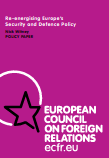INTRODUCTION: What does Russia think?
INTRODUCTION: What does Russia think?
Author(s): Ivan Yotov Krastev, Mark Leonard, Andrew Wilson
Subject(s): International relations/trade, Sociology of Politics
Published by: ECFR European Council on Foreign Relations
Summary/Abstract: If we want to influence and deal with Russia, we need to understand it. But if we want to understand Russia, we should be interested in it. Unfortunately, we are not. The German political philosopher Carl Schmitt – who has become surprisingly popular in intellectual circles around the Kremlin – once noted that “victors feel no curiosity”. This is exactly what has happened to the European Union since the end of the Cold War. Gleb Pavlovsky, a political thinker with a novel-like biography, who is one of the Kremlin’s leading strategists, is right when he argues that the dominant discourse on Russia among Western liberals focuses on what Russia lacks – be it Western-style democracy, the rule of law or property rights. The tragedy of European foreign policy thinking is that we fell in love with our own paradigm. We are so convinced that what others want is to be like us that we are only really interested in whether, when and how they can be like us. For the moment, the Russian political elite does not dream of being like us nor does it want Russia to join the EU. But this does not mean that ideas mean nothing in Russian politics. On the contrary, after the de-ideologized 1990s, Russia is much more like it was in the 1980s, with a lot of intellectual energy unleashed by its quest for its own model.
Book: № 16 THE LIMITS OF ENLARGEMENT-LITE: EUROPEAN AND RUSSIAN POWER IN THE TROUBLED NEIGHBOURHOOD
- Page Range: 1-6
- Page Count: 6
- Publication Year: 2009
- Language: English
- Content File-PDF

